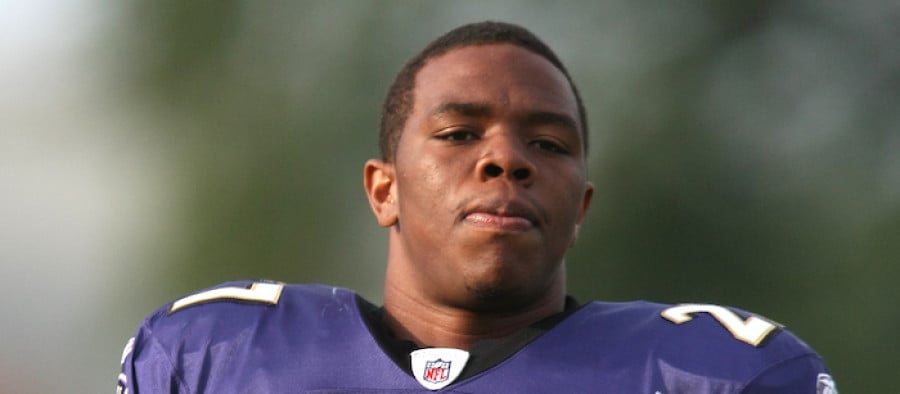Ray Rice, domestic violence and the NFL’s Personal Conduct Policy

It has been an ignominious start to the 2014 NFL (“the League”) season. The League, and in particular its Commissioner, Roger Goodell, find themselves in more trouble than many can remember, following a spate of incidents involving acts of domestic violence and child abuse. Public outrage has boiled over in reaction to these incidents and to the league’s handling of them.
One incident in particular has provoked a profound and decisive reaction from the League. The incident involved former Baltimore Ravens running back Ray Rice. The 7th year veteran’s despicable actions and the NFL’s handling of his ensuing suspensions brought a number of issues surrounding player conduct rules into light and have prompted the NFL to make wholesale changes. This article will take stock of that incident and the events that followed, before considering what lies ahead for the NFL.
THE FACTS
On 15 February this year, former Baltimore Ravens running back Ray Rice and his now wife Janay Palmer, were arrested for assault at an Atlantic City casino. The Atlantic City Police Department stated at the time that “after reviewing surveillance footage it appeared both parties were involved in a physical altercation”.1 NFL.com reported that a summons for Rice stated he had hit Janay Palmer and “caused her to lose consciousness.”2
Rice was charged with third-degree aggravated assault.3 He avoided trial by agreeing to a pre-trial intervention program, which involves a guilty plea in exchange for the opportunity and no conviction upon successful completion of the program. Soon after, CCTV footage was released showing Rice dragging his semi-conscious wife from an elevator in the Revel Hotel and Casino.
The two game ban
Following this, on Thursday 24 July the NFL banned Rice for two games.4 To put this decision into context, Cleveland Browns wide receiver Josh Gordon had just been suspended for the entire season for using marijuana5 (although the league is now considering a reduction6). This led many to the same conclusion: in the NFL’s moral universe, recreational drug use is more punishable than domestic violence.
The indefinite suspension and Rice’s release
On Monday 8 September, full footage from inside the Revel Hotel elevator was released by TMZ showing Rice punching Palmer and knocking her out cold.7 Hours after this second video emerged, Rice was released by the Ravens. Shortly after that an NFL spokesperson announced he had been indefinitely suspended from the League.
In an interview aired on CBS on Tuesday 10 September 2014,8 the NFL Commissioner Roger Goodell categorically stated that he and nobody in the League had seen the second video until Monday. However on Wednesday 11 September 2014, the Associated Press reported that an NFL executive had been sent a copy of that video, and produced a voicemail dated 9 April 2014 from an NFL phone number, confirming receipt of the video and commenting “you’re right, it’s terrible.”9
These revelations have rocked the NFL. It would appear at first blush that either Goodell lied, or he was unaware of vital information held by his own league. Whatever proves to be the case, Goodell’s decision to increase the original two game ban not only undermined himself and the league’s conduct policy, but also has legal implications.
The NFL’s Personal Conduct Policy
Rice’s initial ban and following indefinite suspension were issued under the terms of the NFL’s former Personal Conduct Policy (PCP).10 This policy is being reviewed and is expected to be amended as a consequence of the above events and a look at its provisions will illustrate its shortcomings and what needs to change.
The PCP governs the conduct of all NFL staff and affiliate members, including athletes, and states:
“While criminal activity is clearly outside the scope of permissible conduct, and persons who engage in criminal activity will be subject to discipline, the standard of conduct for persons employed in the NFL is considerably higher. It is not enough simply to avoid being found guilty of a crime. Instead, as an employee of the NFL or a member club, you are held to a higher standard and expected to conduct yourself in a way that is responsible, promotes the values upon which the League is based, and is lawful."11
This is laudable language that sets admirably high standards. It is also incredibly vague, and sets the league up for embarrassment when claims of a “higher standard” appear toothless and misguided in instances such as this.
The policy lists a number of prohibited acts. It explicitly mentions domestic violence, stating that discipline may be imposed in circumstances involving “domestic violence and other forms of partner abuse”. It also includes “conduct that imposes inherent danger to the safety and well-being of another person” and “conduct that undermines or puts at risk the integrity and reputation of the NFL, NFL clubs or NFL players."12 These clauses leave no doubt as to the league’s stance on Rice’s acts, which fall under all three heads.
Why then was the initial ban so inadequate, and the following indefinite suspension so disparate from the initial decision?
Vague disciplinary provision
One of the major problems with the policy is its disciplinary provision. The key paragraphs read as follows:
“Upon learning of conduct that may give rise to discipline, the League may initiate an investigation to include interviews and information gathering from medical, law enforcement, and other relevant professionals…Upon conclusion of the investigation, the Commissioner will have full authority to impose discipline as warranted.
Discipline may take the form of fines, suspension, or banishment from the League…"13
To continue reading or watching login or register here
Already a member? Sign in
Get access to all of the expert analysis and commentary at LawInSport including articles, webinars, conference videos and podcast transcripts. Find out more here.
- Tags: American Football | Criminal Law | Domestic Violence | Governance | NFL | NFL Personal Conduct Policy | Regulation | United States of America (USA)
Related Articles
- University of California sued for wrongful death of American football player
- Ex-NFL linebacker’s Workers’ Compensation Claim proceeds on basis of two games played in California
- NCAA using O’Bannon decision to seek dismissal of other suits
- Another hurdle in the Washington Redskins’ fight for trademark protection
Written by
Tom Cripps
Tom is a paralegal who most recently worked in property litigation at Wedlake Bell, assisting on a broad range of matters across the department. He previously spent six months in commercial property and prior to that worked in international litigation.
He is a University College London LLM graduate.
Tom has a passion for sport (particularly tennis and American football) and the legal issues within sport.


